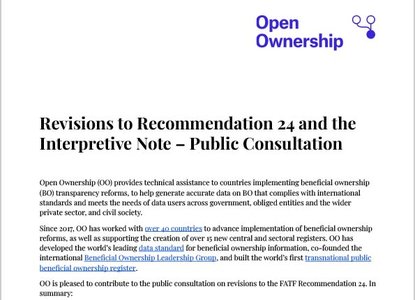FATF recommendation 24: Global standards on beneficial ownership are rising

The Financial Action Task Force (FATF) – the international standard-setting body on anti-money laundering and countering the financing of terrorism – has approved revisions to its Recommendation 24 (R24) on beneficial ownership. Based on FATF’s public statement and our analysis of the text put out to public consultation, this is encouraging news. The statement mentions several measures that, provided they are properly implemented, can strengthen global defences against money laundering and terrorist financing.
We reviewed the revisions to Recommendation 24 according to the Open Ownership Principles, an evidence-based framework that describes the key features of effective beneficial ownership disclosure. In particular, we welcome FATF’s significant shift towards requiring central beneficial ownership registers. Research shows that this is the most effective method of ensuring that authorities have rapid and efficient access to beneficial ownership data. However, the details are still to be worked out in the forthcoming FATF guidance, and this will ultimately determine how effective the new recommendation is.
Thom Townsend, Open Ownership’s Executive Director, said: “The revisions to FATF Recommendation 24 come close to mandating central beneficial ownership registers. It retains an option to use an alternative mechanism, however it is difficult to see how this could achieve the outcomes FATF requires. FATF’s guidance due later this year will define what a good-enough alternative mechanism is. If the new recommendation is to be impactful, this guidance should rigorously adhere to the core outcomes that FATF requires:- efficient access to verified data, as well as prohibit less effective and ineffective methods.”
Initial analysis
Here is Open Ownership’s initial analysis of the changes to R24:
Central registers
The revised recommendation 24 takes an important step closer to requiring central beneficial ownership registers, although it falls short of making a clear and unequivocal obligation. It still permits countries to use “an alternative mechanism” if it also provides efficient access. Considering there is now the addition of a requirement for beneficial ownership data to be available to all public authorities during public procurement, it is difficult to see how this can be done effectively without first gathering the data in a central register.
Public access
The revisions put out to consultation stated that countries should “consider” public access to beneficial ownership information. There is no mention of this in FATF’s public statement, so it remains to be seen if this has been included in the adopted text. Our research highlights the importance of public access to beneficial ownership data for fighting financial crime. As the new FATF standards cement progress towards centralised beneficial ownership registers, we must not lose sight of the specific benefits that can only be delivered through publicly accessible registers. In addition to the well-documented use of data by journalists and civil society organisations to uncover and expose money laundering, public registers also make it more efficient for foreign law enforcement to access and use beneficial ownership data within their investigations.
Robust definitions
It was positive that the revisions put out to consultation framed a 25% ownership threshold as a “maximum”. Previously, 25% was given as an example threshold and this led many countries to interpret this as FATF’s recommendation. Assuming this remains in the adopted revisions, this wording will send a strong signal that lower thresholds may be more effective in achieving the stated policy aims. Our research shows that a 25% threshold can leave many relevant beneficial owners undisclosed.
Comprehensive coverage
The changes bring foreign-created entities that have a “sufficient link” to a country within the scope of disclosure. Unfortunately “sufficient link” was not defined in the text put out to consultation, so countries will need to adopt a broad interpretation, such as “any business link” with the jurisdiction, if this is to close loopholes.
Sufficient detail
The revisions require that the collected data contains sufficient details that are “adequate for identifying the beneficial owner”. This was a key Open Ownership recommendation to FATF in August 2021, and it’s encouraging to see this brought into focus, although the strength of this wording will depend on the details of how countries are required to implement it.
Verification
Importantly, Recommendation 24 now requires that beneficial ownership information be verified, although there is little detail on what constitutes adequate verification. In line with the Open Ownership Principles, FATF now also prohibits the issuing of new bearer shares, the ownership of which is essentially unverifiable, although they do not explicitly require the capturing of existing bearer shares. This policy briefing outlines approaches to effective verification.
Up to date and auditable
The revisions put out to consultation took a step forward in defining what up-to-date beneficial ownership information means, specifying one month as an example of a “reasonable period” within which information should be changed. Stipulating this as a maximum time would have been stronger, since as we saw with the FATF example of a 25% threshold, “one month” risks being interpreted as a formal recommendation. Many implementing countries already specify far shorter periods, therefore already exceeding this recommendation. The revisions put out to consultation also did not specify that all changes should be reported, which leaves a considerable loophole.
Conclusion
Overall, the updated Recommendation 24 significantly strengthens the potential of the FATF standards to tackle money laundering and terrorist financing. As the world faces new security challenges and increased focus on Russian ownership of companies, and property and other assets owned by overseas entities, there is renewed political urgency to take action against anonymous ownership of companies.
However, as with any international standard, the success of the FATF recommendations will depend on how effectively they are implemented. The details of this are hugely important, and are yet to be worked out. During the coming months, FATF will produce guidance that will assist countries in understanding how to implement the provisions in Recommendation 24. Open Ownership welcomes the FATF’s intention to “analyse the growing practical experience of implementing beneficial ownership registries, with a view to identifying best practices and supporting implementation by countries”. We stand ready to support FATF in this important work by sharing our research and expertise from our in-country implementation work with almost 40 countries around the world.
Related articles and publications
Publication type
Blog post
Topics
Financial Action Task Force (FATF)
Sections
Research
Open Ownership Principles
Definition,
Coverage,
Detail,
Central register,
Access,
Verification,
Up-to-date and historical records


